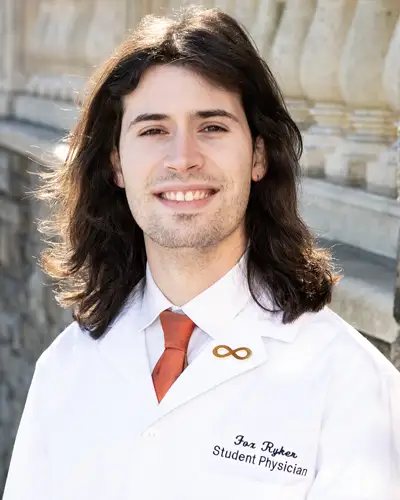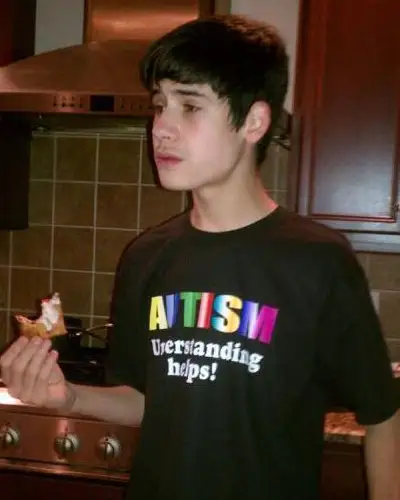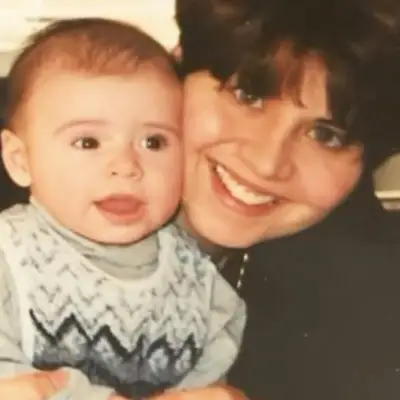Embracing Neurodiversity in Medicine:
Insights From an Autistic Medical Student
April 11, 2024By Fox Ryker (DO ’27)

Two decades ago, I received a medical diagnosis that would change my life.
Diagnosed with moderate autism spectrum disorder, my physicians at the time were unsure
whether I would be able to live independently. I was nonverbal until I was four, went
to four different elementary schools, two different middle schools, and received a
decade of therapy.
Today, I am a first-year osteopathic medical student at Philadelphia College of Osteopathic Medicine (PCOM) and have continued to defy expectations and preconceived notions surrounding my diagnosis.
April is World Autism Month and Celebrate Diversity Month, and an opportunity to recognize
the unique talents, insights and strengths our diversity—in all its forms—brings to
the community. As an autistic medical student, I know firsthand that the perspectives, experiences and identities we each bring
to the table strengthen our collective understanding of the world around us, and will
ultimately make us better doctors.
As children, we take in verbal and nonverbal cues and gestures from those around us,
helping us formulate our own ability to communicate both smoothly and effectively.
For those with autism, this can be a struggle, and the process must be actively reinforced.

When I was a child, I took social dynamic classes, learning how to initiate conversation,
respond to others, read facial expressions, understand social cues, and so much more.
In a typical conversation, I often have to consciously reference those lessons, and
systematically apply them to every aspect of my interactions with others. Am I maintaining
eye contact? Am I matching their body language? Am I sharing the appropriate amount
of information?
The best analogy I’ve come across to describe this process is when someone is speaking
a language other than their native language. They will usually have to consciously
refer back to their first language, which can be exhausting and mentally draining.
For me, I am actively listening, but also, simultaneously, employing a technique referred
to as masking. Masking is when an autistic person suppresses their autistic traits
(stimming, oversharing, hyperfocusing, etc.) in order to conform to socially compatible
mannerisms. When a person is very good at masking, you’ll often not even realize they’re
doing it.
Having developed these skills over the years, I feel confident in my ability to communicate
with my medical school peers, but can sometimes miss nuances or come off as awkward.
Autistic people tend to think very literally, so recognizing idioms, sarcasm, and
passive-aggressiveness can be a struggle. This, in turn, might make us appear to be
instigative, when in fact we might have completely misunderstood one’s point. And
though they often struggle with outwardly expressing their feelings, almost every
autistic person I’ve ever met has been empathetic and compassionate.

Autism is just one disorder under the neurodivergent umbrella and, according to the
CDC, 1% of the world population is autistic. That would suggest that, statistically,
there are other autistic medical students at PCOM, all with their own perspectives
to share. Whether autistic, allistic, neurodivergent, or neurotypical, we all possess
traits that are unique to us. Our neurodiversity is not a hindrance, but a strength
in our ability to become good doctors. These strengths are shown through our unique
lived experiences. In my case, my therapy has allowed me to excel in nonpharmacological
approaches to de-escalating crisis moments. As an emergency room technician prior
to coming to PCOM, for example, my experience as an autistic person made me a valuable
contributor whenever an autistic patient presented to the emergency room.
The relationship between one’s diversity and their health is also affirmed through
the Tenets of Osteopathic Medicine that all student doctors agree to uphold, and its understanding is paramount in providing
effective treatment and compassionate care. Our differences can also provide perspective
in fostering the holistic approach to patient care for which PCOM is known.
All of the challenges I’ve described from my own experience and for others with autism
or other neurodivergencies are things we manage on a day-to-day basis. This is also
true for the multitude of other diverse groups that make up the PCOM community. Those
challenges—and all of our differences—form the basis of our experience and are what
make us unique. They are worth celebrating and will make us better doctors, and ensure
our patients are seen and heard.
Fox Ryker is a first-year medical student from Coatesville, Pennsylvania, and contributed
this article in recognition of World Autism Month and Celebrate Diversity Month, each
recognized every April to encourage inclusivity, celebrate differences and honor the
diversity of the world around us.
About Philadelphia College of Osteopathic Medicine
Established in 1899, Philadelphia College of Osteopathic Medicine (PCOM) has trained
thousands of highly competent, caring physicians, health practitioners and behavioral
scientists who practice a “whole person” approach to care—treating people, not just
symptoms. PCOM, a private, not-for-profit accredited institution of higher education,
operates three campuses (PCOM, PCOM Georgia and PCOM South Georgia) and offers doctoral degrees in clinical psychology, educational psychology, osteopathic
medicine, pharmacy, physical therapy, and school psychology. The college also offers
graduate degrees in applied behavior analysis, applied positive psychology, biomedical
sciences, forensic medicine, medical laboratory science, mental health counseling,
physician assistant studies, and school psychology. PCOM students learn the importance
of health promotion, research, education and service to the community. Through its
community-based Healthcare Centers, PCOM provides care to medically underserved populations.
For more information, visit pcom.edu or call 215-871-6100.
Contact Us
For general media inquiries, please contact the Office of Marketing and Communications
at 215-871-6300 or communications@pcom.edu. Visit our media relations page to view contact information for public relations personnel.
Connect with PCOM




